There is no sign outside Arcigay’s Rome offices. It is symbolic of Italy’s attitude toward homosexual people. Outwardly there is absence, ignorance, denial and refusal to openly accept the reality of a LGBT community in Italian society. But inside the Arcigay office there is a bright, cheerful, energized organization driving into the future. Gay folks here are forging ahead despite much resistance from conservative politicians and endless rejections from the Vatican hierarchy.
 Even a brief knowledge of the church’s stance on this ‘inherent moral evil’, as the late pope put it, is cause for simultaneous anger and pity from gay people. Anger at the church’s ignorance about human nature and pity that it has become lost in its own theology that it cannot think in more modern terms. Said one activist, “they wear antiquated clothing, repeat ancient rituals and are cornered by their own materialistic traditions; the church hierarchy cannot confess their blindness about homosexuality.”
Even a brief knowledge of the church’s stance on this ‘inherent moral evil’, as the late pope put it, is cause for simultaneous anger and pity from gay people. Anger at the church’s ignorance about human nature and pity that it has become lost in its own theology that it cannot think in more modern terms. Said one activist, “they wear antiquated clothing, repeat ancient rituals and are cornered by their own materialistic traditions; the church hierarchy cannot confess their blindness about homosexuality.”
But such policies are slowly but surely loosing their grasp. Catholic Spain told the Vatican to butt out of politics when the Spanish government voted to allow gay marriage in 2006. Now in 2007, the Italian governing party teeters on the edge of approving gay civil unions.
(1) Arcigay and LGBT Organizations
Operating despite much opposition, Franco Grillini started Arcigay in 1985 when both the church and state stone-walled emerging public homosexual expression. Grillini is now a member of the Italian parliament and gay unions (DiCo) are closer to reality; it’s obvious who is going to win this war, but not without political and social bloodshed.
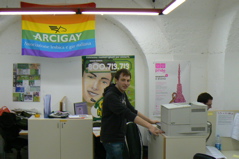 Carlo Guarini invited me in to see Arcigay’s beehive of activity energized by more than 100 volunteers (at different times). His partner is Roberto Stocco whose handsome face appears large and bold on the oversized posters around town advertising the DiCo rally in March 2007.
Carlo Guarini invited me in to see Arcigay’s beehive of activity energized by more than 100 volunteers (at different times). His partner is Roberto Stocco whose handsome face appears large and bold on the oversized posters around town advertising the DiCo rally in March 2007.
DiCo unions are similar to the French PACS but with fewer rights. Called DiCo’s, for dirriti conviviento (‘Di co’ also means ‘I say’ in Italian), the road to passage of the legislation was derailed by a recent vote of no confidence (on a foreign policy issue) in the current prime minister’s (Romano Prodi) government. But the congress quickly realized they had shot themselves in the foot with that vote and voted again (out of fear of conservative Berlusconi returning) to keep Prodi, but now weakened in his support for DiCo’s.
Fabritio Marratto is the current (volunteer) president of Arcigay Rome. Operating on a slim budget derived mostly from private donations and a bit of government funding for HIV/AIDS education, Arcigay has no paid staff. Funding also comes from membership card purchases (for discounts at gay venues).
Carlo and volunteers Nino and Francesco explained some of the Arcigay programs and activities such as counseling, legal advice, lobbying and social activities. One of the newer services is the phone Helpline set up last year. Nino was on duty the day I visited and fielded calls as the four us talked about gay life in Rome.
Nino was on duty the day I visited and fielded calls as the four us talked about gay life in Rome.
Where is love found? How safe is it to be out? What do parents think? How do you make friends? What about gay youth and lesbians? What’s the political agenda? What’s the future for DiCo’s?
Regarding the women, there is Arcilesbica in Italy which is a co-equal and independent organization with similar and different agendas (see below).
Nino said there was a training program to educate phone volunteers how to respond to callers and to deal with their questions, fears and issues. He also commented that some women call in but hang up when they hear a man’s voice. Others, mostly men, are afraid and hang up once or twice before they have the courage to actually talk.
Nino is a professional stage dancer and had a primary relationship that lasted a couple of years. Now single again he lives a busy and satisfying life in Rome without accessing the bars or clubs. Friendships are the mainstay of social life for him. But he is not out to his parents who live in Naples, two hours south of Rome, which is even more conservative than Rome. He is, not surprisingly, apprehensive about their reactions and does not want to hurt them “because they don’t understand about homosexuality.” And he does not feel he as to be out to everyone or show his sexuality in public. “I live quietly and am happy with myself. If I have another boyfriend it will by accident, not by searching.”
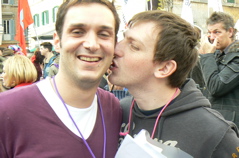 Carlo, 23, came out to his parents at 16. They were not apparently upset and have been welcoming to his partner Roberto (photo left), as have Roberto’s parents toward Carlo. Roberto is in communications and has appeared on a gay TV program.
Carlo, 23, came out to his parents at 16. They were not apparently upset and have been welcoming to his partner Roberto (photo left), as have Roberto’s parents toward Carlo. Roberto is in communications and has appeared on a gay TV program.
Francesco is the volunteer secretary/coordinator of Arcigay Rome who is busy with such issues as memberships. He and his partner of two years met in a chat room online.
But this was not the best moment to visit Arcigay, two days before a major public demonstration. Volunteers were bustling about with meetings, coordinating committee activity, getting posters up, arranging speakers, equipment and the Arcigay information booth at the rally (see below).
The Scene
For a major world city of nearly 4 million (including the surrounding province) Rome has a modest number of LGBT venues and organizations despite and because of its general homophobia. Rome is where heterosexual marriage and children-making are unquestionable pillars of the standard social structure. And although fewer and fewer Roman citizens regularly attend the countless churches in town (many cracked and closed),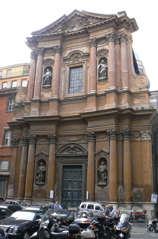 the emotional and political weight of centuries of Catholic rituals and dogma are inescapable.
the emotional and political weight of centuries of Catholic rituals and dogma are inescapable.
(It can easily be said that the church built Rome. Virtually every piazza has at least one gothic, baroque, neoclassical, renaissance or 19th century towering edifice and steeple overlooking the bustling life below as a reminder as to who is ‘lord’. It also provides many soup kitchens for the poor.)
According to the gay entertainment magazine ‘Divo’ there are about fifteen bars/discos, five saunas, two sex shops, about 25 LGBT associations, three pro-gay hotels, a swanky Eduardo II restaurant (prix fixe about $50) and a number of private sex clubs that provide total anonymity among mostly gay and bisexual strangers whose sexual truth is securely hidden behind closed doors and in the closet.
(2) Roman Lesbians
In contrast to mythological and powerful women such as Athena, Aphrodite and Diana who could determine the fate and flow of men, today’s lesbian women do not feel as empowered. Indeed they feel intimidated and cowed by the omnipresence of that male bastion of opinion and dogma known as the Vatican.
During a visit to the Arcilesbica office in suburban Rome (in the St Maria del Soccorso district; Metro stop Pietralata), among working class cement-and-brick apartments blocks, I was advised not to underestimate the power of institutionalized religion in Rome and Italy. 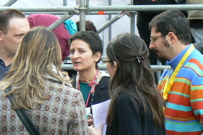
“Nowhere else in the western world can you find such a deep and strenuous arm of religion injected into politics and government as you see in Rome,” said Rosarita, a stylish and articulate member of Arcilesbica Rome. “The separation of church and state in 1929 was only a piece of paper. The reality is interference and influence. Lesbians have no place of power in politics or respect from the church because of the pope’s attitude—and this one is worse than the last,” referring to the current German-born pope who is often rumored to have a homosexual history: “that’s why he is so much against us.”
Indeed, in the media coverage after the rally more than one newspaper scolded speakers and spectators for being disrespectful toward the Vatican and for mocking it. Some demonstrators wore paper tiaras with the words ‘No Vat’ as a protest against papal intervention into civil and political issues. In this ‘holy city’ the privilege of the church is such that few openly criticize it or openly condemn its homophobic policies of discrimination. Those who do take the church to task are invariably disparaged by mainstream opinion. (In my hotel room three out of the four pictures and etchings on the walls were of churchy subjects.)
Arcilesbica is the independent sister organization of the gay male Arcigay–little sister, since there are only about fifty card-carrying members (with additional support and attendance for special events) compared to the thousand-plus members of Arcigay. Two other women members Claudia and Vera assured me that the two organizations work easily together when necessary such as for the March 10, 2007 demonstration (see below) supporting DiCo legislation. At the various gay venues across the city, Vera said, men and women mix easily and only a small number of women are separatists.
 Arcilesbica carries on political activism, offers a phone help line one evening a week, and, most importantly, offers social and emotional support to members or anyone wanting it. The evening I visited about twenty women gathered for the popular semi-monthly discussion/support group facilitated by a psychologist. Topics such as fear, rage, coming out and dating are discussed.
Arcilesbica carries on political activism, offers a phone help line one evening a week, and, most importantly, offers social and emotional support to members or anyone wanting it. The evening I visited about twenty women gathered for the popular semi-monthly discussion/support group facilitated by a psychologist. Topics such as fear, rage, coming out and dating are discussed.
Many women fear coming out in such a heavily heterosexual society where family—marriage and kids–is fundamental to the traditional Italian way of life. Even lesbians who may be out to their own inner circle of friends will not want to converse or contact other lesbians in public or at social functions.
Vera felt that about 70% of lesbian women have primary live-in relationships—usually hushed behind closed doors. In Rome and other major Italian cities two women sharing a flat as ‘friends’ is common. But they will only say they are flat mates if anyone outside their inner circle asks. Claudia thought women seek monogamous relationships more naturally than men, who are “more adventurous and wandering.”
These words of insight were all the more valuable because only one of these helpful women—Rosarita–was easily articulate in English. Despite the European Union and its touted unification themes, the vast majority of Italians in Rome do not speak English (not that they should). So the generous efforts of Vera and Claudia were much appreciated.
Lunch with Rosarita
The following day Rosarita Costa talked further at lunch (at restaurant Settinio all’Arancio, via dell’Arancio, 50/52, Roma) near the elegant Spanish Steps and the Keats-Shelley-Byron museum.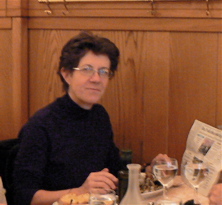
Rosarita is a fashionable career woman in her fifties who has lived in Europe, America and Mexico during her professional life. She is out to anyone who cares to know at work and is comfortable with her family who have mixed reactions; she does not hide her lesbian aspect from anyone. At her workplace—an international legal firm–there is a liberal and tolerant policy of inclusion so there is no need to mask or falsify her truth. Mostly people in her office don’t care to know who is gay or lesbian but if they know they don’t really care about the differences. The partners and staff have their own lives to attend to and have no time or intention to act against someone’s personal lifestyle. Rome is too big and life is too short to bother much about such things said Rosarita.
So she feels ‘safe’ and goes about her managerial work with no interference other than the usual frictions between different personalities working closely. Her lesbian activity is focused outside work, at Arcilesbica, where she recently became a member after returning to Rome four years ago. “When I was younger, living in London and Paris, I was a lesbian activist in the cause of equal rights and purging the stigma attached to homosexuality; in the seventies and eighties it was a time of change, uneven change, in Europe and America. Afterwards I eased out of frontline pro-gay work and for years I was okay with being supportive of the younger generation taking charge and creating organizations and lobbying government for further change.
“But when I came here to work in Rome, it was like stepping backing time for LGBT people. Yes, there were associations and activists but I felt there was much more work to do to oppose the oppression coming from the Church. I have never seen such direct, vocal and determined discrimination. I was shocked so now I’m back in the ring having joined Arcilesbica to continue to struggle.”
What Rosarita also finds disappointing is the degree of “indifference and arrogance” of heterosexual Romans toward this discrimination. “They don’t see the injustice. They have what they want and don’t care about others…their arrogance infuriates me.” She also felt this self-satisfaction extends among many lesbian couples who protect their identities in comfortable closets and will not risk public view or won’t join Arcilesbica.
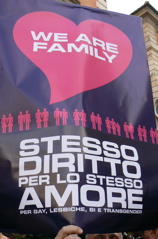 As for the current hot topic of domestic partnership unions (DiCo’s) Rosarita has much to feel disappointed about. “This bill is too small and too fuzzy and insufficient. It offers us almost nothing that is close to hetero marriage rights.”
As for the current hot topic of domestic partnership unions (DiCo’s) Rosarita has much to feel disappointed about. “This bill is too small and too fuzzy and insufficient. It offers us almost nothing that is close to hetero marriage rights.”
The point that aggravates her most is the excessively long waiting period before some of the partnership benefits kick in. To receive inheritance rights a LGBT couple (or co-habitating straight couple) have to prove they have lived together for nine years. The same right is granted to a hetero married couple the moment after they say ‘I do’. In order to keep a rental agreement or secure pension-survivor rights after the death of a partner the ‘widow’ has to prove they have lived together for at least three years.
Further, in Italy a partner–gay or straight—cannot legally will his estate to an unmarried significant other. After a death, any blood relative can come in and take all or part of the estate as ‘family’ and usurp a long-term partner.
“DiCo’s don’t really offer that much to a partnerships; they offer individual rights, really, not partnership rights,” added Alessandro from Arcigay the next day.
A Chat with Julia
Julia Pietrangeli is an articulate 36 year-old Rome-based board member of the national organization of Arcigay and Arcilesbica, which is headquartered in Bologna. As a professional she works for IBM, known for it liberal attitude toward lesbigay employees.
Similar to Rosarita, a major lament for Julia, as a highly active gay rights advocate, is the overwhelming presence and stultifying oppression of the Catholic Church. ”It has such vast influence–spiritually, financially, institutionally and politically and in the workplace. It owns half of Rome in its huge real estate portfolios—hotels, apartment blocks, commercial businesses; and they don’t pay taxes!,” she declared in an indignant voice. 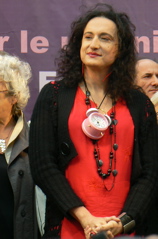
And because the church bureaucracy is so entrenched inside Rome and the Vatican they are little challenged to change their rigid patriarchal attitudes by secular forces. They exert a serious pressure on the parliament through their intense lobbying–personally, privately and from the pulpit. “They are an old culture, an old mindset…so far behind Spain that has give gays the right to marry.”
Julia said there are really very few liberal or independent-minded members of parliament today. (The Italian Liberal party is actually far right and anti-gay.) At the March 10 pro-DiCo three MP’s bravely attended and spoke which resulted in their being criticized by Prime Minister Prodi and the media for supporting the ‘pope-bashing’ event.
Julia thought it was the highest level of hypocrisy that many MP’s live with unmarried partners—or have secret extra-marital affairs–yet reject the DiCo legislation, which covers straight as well as LGB couples.
Currently in the parliament there is one openly gay, one openly lesbian and one transsexual member (Vladimir Divinia, photo above right with clock around her neck to remind people of the theme ‘time is running out–DiCo’s now!’).
As an out and visible lesbian activist, Julia was pleased to see that the younger generation of lesbians appeared less afraid than in the past. She sees more courage and daring among young people (16-25) and is glad that lesbian separatists have not had much influence with the young women as they mix often and easily with the young men.
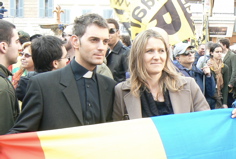 “I think this is a changing point in our history now. It’s the beginning of the end of the stranglehold of the church. Also helping the change is the fact that homosexuality in Italy was never criminalized because native gays were not thought to exist to any serous degree (although the fascists actively persecuted them in the 1930s and early 1940s).
“I think this is a changing point in our history now. It’s the beginning of the end of the stranglehold of the church. Also helping the change is the fact that homosexuality in Italy was never criminalized because native gays were not thought to exist to any serous degree (although the fascists actively persecuted them in the 1930s and early 1940s).
This has had a paradoxical effect in recent decades: LGBT people have not been arrested or attacked yet by the same token there has not developed an active culture of rebellion against the covert and overt repression of the church, the mafia and the government. “The enemy was for a long time invisible and did not galvanize a gay-rights surge. Even today most people—gay or not—cannot see the hidden forces that govern ‘democratic’ Italy…corporate villains,” Julia lamented.
Finishing her impassioned conversation, Julia described Arcilesbica/Arcigay as a proud inclusive civil rights achievement. The national organization has offices in 22 cities across Italy with national meetings four times a year at the head office in Bologna. “Each year we have become stronger and more open, pushing for heightened political and social consciousness and urging more personal responsibility to resist both visible and invisible enemies…Arcilesbica is now a permanent reference point for gay women; we are here to stay and to empower their lives.”
(Two other local Roman LGBT organizations are Mario Mieli association and the DG Project (Dee Gay Project), which are mixed gay and lesbian social groups not primarily involved in activism but still participate in the rallies.
(3) DICO Demonstration Rally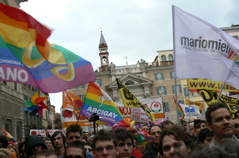
In a colorful and vocal protest against the threat that Prodi’s weak and realigned coalition might scuttle the DiCo bill, a large rally of about 10,000 DiCo supporters was held under an overcast but friendly sky on Saturday March 10, 2007 in Piazza Farnese.
The action was a strong-willed reminder that DiCo rights will not be silenced and will not go away. One after another, about a dozen notable and passionate speakers told the crowd—and a larger TV audience—that DiCo rights, gay rights, non-marital rights are human rights granted to all Italians regardless of gender or sexual orientation.
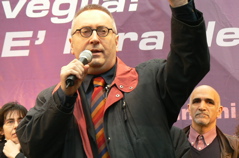 Flailing at the hypocrisy of Italian political leaders whose own marital lives have been scandalous, Arcigay founder and current member of parliament Franco Grillini (left) took to task the clichéd ‘family values’ defense often used against non-straight, non-married couples: ‘Heterosexual leaders of this country do more to damage and threaten the institution of marriage. We are looking to form loving relationships not shame and violate them like our illustrious government leaders.”
Flailing at the hypocrisy of Italian political leaders whose own marital lives have been scandalous, Arcigay founder and current member of parliament Franco Grillini (left) took to task the clichéd ‘family values’ defense often used against non-straight, non-married couples: ‘Heterosexual leaders of this country do more to damage and threaten the institution of marriage. We are looking to form loving relationships not shame and violate them like our illustrious government leaders.”
Current Arcigay national president Sergio Lo Guidice from Bologna was vehement in his demand that every Italian citizen be treated with equal respect without exception.
Arcigay Rome president reminded the thousands that “we are in new territory now; never have LGBT people been so present and public and self-assured to demand recognition of our relationships in a legal form. 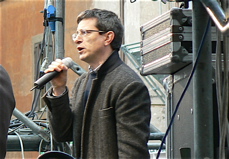 This is where we should be and it’s time now for the government to wake up and realize this is a new age, not the dark ages of blind ignorance. Gay people have always been part of the Italian culture and gay people have created some of the greatest art and architecture of our beloved country. We are alive now and have been alive for a thousand years. We are moving ahead and want our live and loves to be seen and named and legalized.”
This is where we should be and it’s time now for the government to wake up and realize this is a new age, not the dark ages of blind ignorance. Gay people have always been part of the Italian culture and gay people have created some of the greatest art and architecture of our beloved country. We are alive now and have been alive for a thousand years. We are moving ahead and want our live and loves to be seen and named and legalized.”
The idea of ‘time running out’ was the major theme for the rally. Posters all over the city displayed male and female couples holding a clock underlined with the words ‘Time is running out—DiCo’s now.’
Emphasizing the point, Italy’s first-ever transsexual member of parliament, Vladimir Divinia in a bright red dress and flowing long black hair, wore an old-fashioned alarm clock around her neck as a highly visible reminder to all present—and for the evening news—that all Italians may be different but we all deserve the same rights and respect. Vladimir’s presence was highly applauded by the supportive audience who have followed her controversial career into and within politics upsetting the status quo and heterosexist presumptions about human sexuality.
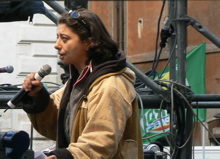 Arcilesbica was very present in the form of countless lesbians in the audience and several speakers on stage. National Arcilesbica president (left) spoke in no-nonsense terms about the rights of lesbians—and indeed all women—to be fully equal in every aspect of Italian life including heterosexual marriage and heterosexual co-habitation as well as same-sex relationships.
Arcilesbica was very present in the form of countless lesbians in the audience and several speakers on stage. National Arcilesbica president (left) spoke in no-nonsense terms about the rights of lesbians—and indeed all women—to be fully equal in every aspect of Italian life including heterosexual marriage and heterosexual co-habitation as well as same-sex relationships.
As a reminder of the possibility and reality of same-sex relationships, a large banner was strung across the face of one of the many renaissance buildings in the Piazza Farnese; against a white background in bold red and black letters were the words ‘lo DiCo Zapatero!’ (‘say it like Zapatero’) a clear reference to the Spanish prime minister who advanced gay marriage in Spain last year.
A Struggle for the Future
Some of the greatest opponents of DiCo’s are the men in the Catholic church across town in Vatican City.  One estimate is that there are about 900 churches in Rome. The grandest of which of course is St.Peter’s Basilica where from on ‘high’ the Catholic church issues a constant stream of anti-gay opinions including anti-DiCo claims that they will undermine the family unit. (Apparently the clerics have not visited Spain lately to determine the alleged sabotage of heterosexual marriage in the past year.)
One estimate is that there are about 900 churches in Rome. The grandest of which of course is St.Peter’s Basilica where from on ‘high’ the Catholic church issues a constant stream of anti-gay opinions including anti-DiCo claims that they will undermine the family unit. (Apparently the clerics have not visited Spain lately to determine the alleged sabotage of heterosexual marriage in the past year.)
Despite the official separation of church and state in 1929 (the Vatican does not get a direct vote in the Italian parliament) there are plenty of members willing to do its bidding.) Committed opponents of DiCo’s have declared war on the legislation. Ordinarily their votes might be in the minority but given the recent fragmentation among the ruling coalition the DiCo bill has been moved further back on the agenda of the re-aligned coalition. Not unlike many democracies, in-fighting and party politics appear to come before human rights.
The rally was given coverage on the evening news and on the following day five major newspapers reported the rally on their front pages. Not surprisingly, L’Osservatore Romano, the Vatican newspaper, carried no coverage of the rally, preferring instead to print oversize pages about church history and the impending sainthood of the late pope John Paul II (who called homosexuals “inherently immoral”). See Reuters report on the demonstration.
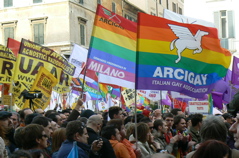
Also see:
Gay Italy Stories
Gay Italy News & Reports 2000 to present
Gay Italy Photo Galleries
















